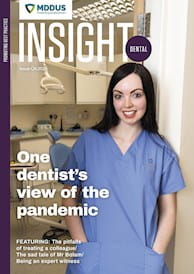WE are surrounded by talk of money – its influence and how we should spend it. Songs encourage us to believe: “Money makes the world go round” – or to dream: “All the things I could do, if I had a little money, it’s a rich man's world”. Yet for all the words spoken about money, many of us are still reluctant to talk honestly about it.
In this article I want to look at why we can be hesitant to discuss money with each other and often with our patients. What are the personal, societal and business reasons? What can we do about it in order to benefit everyone? It is written from the point of view of an ex-clinician who once struggled with the thought of leaving the relative shelter of the NHS to move to independent practice; not least because I would have to charge what my services truly cost to deliver.
That move was what turned out to be the first step towards my financial freedom. That does not mean that I have a bottomless supply of cash, rather that my attitude to money and work changed fundamentally. It led me to my current life where I help dentists and their teams develop a healthy attitude to money and the business services that they provide, and assist them to bring balance to their professional lives.
The context of this, in the shorter term, is the gradual emergence from the Covid-19 pandemic, which will place great demands on everyone, whilst providing unique opportunities. We also need to consider the change in our society where dental healthcare has evolved from being an almost 100 per cent disease-driven, reactive, model of need to one where wants and patient choices are increasingly delivered through elective treatments.
Why don’t we like talking money as individuals? For many of us it is not purely about pounds, euros or dollars but from a fear of judgement. Those with few resources believe they may be viewed as lazy, stupid or a failure. Some who appear to have plenty can feel that they inspire jealousy or resentment from others who may have less. This version of impostor syndrome may lead to feeling less worthy or having a form of personal guilt from the trappings that financial success can bring.
Knowing your worth
I could have called this article “talking about money, and honesty”, because until you are truly honest with yourself you will struggle with the concept of money and charging for your services. That means knowing what your own needs and aspirations are and how much they cost in financial terms, and by being real and not believing the publicity of others. John Niland wrote in his excellent book, The Self-Worth Safari: "it is a need if it is related to basic shelter, security, food or physical wellbeing, if it is essential for emotional wellbeing or it is vital for us to perform at our best. Everything else is a want”.
Understanding business costs
Next comes understanding the business in which you are working. For various reasons, many associates are unclear about the costs of running a dental practice. They may be comfortable in their ignorance, uncurious or would prefer to believe they are (highly) profitable. It could be that the owner is not fully transparent, organised or (all too often) doesn’t know the truth themselves. This situation may be even more opaque for chain or corporate practices where targets are set with little or no consultation or explanation, and associates may be encouraged or even incentivised to “upsell” cosmetic or elective treatments.
Pricing clarity
In our dealings with patients we are morally and legally bound to ensure that there is clarity in the prices they will be expected to pay. The day that I discovered it was easier to look my patient in the eye and tell them what something would cost was a breakthrough. It can be easy to hesitate, to procrastinate or to delegate. When you hesitate, the patient knows and suspects you aren’t convinced of the value of treatment. Procrastinating shows a fear of rejection, and delegation can be an abdication of responsibility. A leadership lesson I learned the hard way was that if I wasn’t prepared and capable of doing something myself, I should never delegate it.
The exchange of time and expertise for money is a fundamental of society in the 21st century. Having problems with the fees you are charging can be a reflection of a lack of self-worth and may show deeper problems with the way, or where, you are working. It is important that your values are reflected in your work, and that you are appropriately rewarded not only for your time invested every day but also for your dedication shown and for your future growth.
Alun K Rees is an experienced dental practice owner who works as a coach, consultant, troubleshooter, analyst, speaker, writer and broadcaster. Find out more at www.dentalbusinesscoach.co.uk
This page was correct at the time of publication. Any guidance is intended as general guidance for members only. If you are a member and need specific advice relating to your own circumstances, please contact one of our advisers.
Read more from this issue of Insight Dental

Save this article
Save this article to a list of favourite articles which members can access in their account.
Save to library
